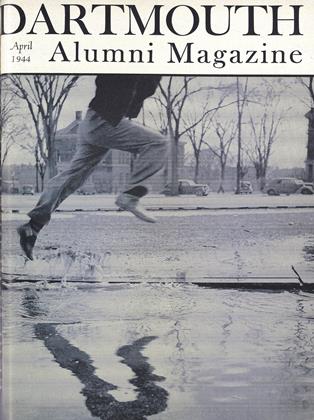by Samuel French Morse '36.The Cummington Press, 1943. 52 pp. $2.75.
In recording my impressions of this first volume of poems I can hardly do better than hang them on one or two phrases from Mr. Wallace Stevens's introduction. I find some of them "a little obstinate," as Mr. Stevens puts it. But I also find in them fresh perceptions of the "particulars of experience" and especially of "New England experience." (We both, I am sure, use the phrase "New England" descriptively; the time has long gon by when it could be used patronizingly as a synonym for provincial.) The poems show a complete integrity. There is nothing soft or shoddy or pretentious or second-hand about them. They have a sureness of form to match the integrity of content. You have to accept them as the perceptions of the poet's own experience, not another's. And if the experience hasn't wide range it has depth and variety: the flowers, animals, weather, landscape of New England; children at night, a fire, a man waking, a sulky race, the compressed history of a New England family. Commonplace experience, but recorded in images that are hard and clear, like facts; precise not precious; neither esoteric nor conventional, but true. For want of space to better illustrate my impressions, I will close with Mr. Morse's own perception of his poems as expressed in the dedicatory lines;
but spare, inadequate, And sometimes grim, the poems stand. Take them for what they are, and wait.
His friends can take them gratefully for what they are: not only as promise but as performance.
South Sea Lore, by Kenneth P. Emory '20, a pamphlet of 75 pages, has been published as "Special Publication 36" of the Bernice P. Bishop Museum. This little volume, which has already gone into the second printing, bears an introduction by Major General Ralph C. Smith. It is intended as an aid to any man who may have to live and fight in the Islands of the Pacific. Descriptions are given of various edible plants, of birds and fish and animals that may be used for food in case of an emergency. A valuable little section is that devoted to treatment of the natives. All in all it seems to be a most valuable publication.
Professor Isaac Joslin Cox '96, Professor Emeritus of History at Northwestern University, is the author of Desarrollo de la Democracia Norteamericana. This book of 178 pages was published by the University of Chile in 1943.
 View Full Issue
View Full Issue
More From This Issue
-
 Article
ArticleCOLLEGE MEN IN POLITICS
April 1944 By DAYTON D. McKEAN -
 Article
ArticleSANBORN ENGLISH HOUSE
April 1944 By LEON BURR RICHARDSON '00 -
 Class Notes
Class Notes1918
April 1944 By ERNEST H. EARLEY, DONALD L. BARR -
 Class Notes
Class Notes1935
April 1944 By ENSIGN JOHN D. GILCHRIST JR., BOBB CHANEY -
 Lettter from the Editor
Lettter from the EditorLetters from Dartmouth Men in the Armed Forces
April 1944 By H. F. W. -
 Class Notes
Class Notes1919
April 1944 By J. KENNETH HUNTINGTON
Stearns Morse
-
 Books
BooksTHE TEACHING OF ENGLISH: AVOWALS AND VENTURES
JUNE, 1928 By Stearns Morse -
 Books
BooksANONYMOUS FOOTSTEPS
February 1933 By Stearns Morse -
 Article
ArticleSidney Cox Prize Established
November 1953 By Stearns Morse -
 Books
BooksIN THE CLEARING.
May 1962 By STEARNS MORSE -
 Books
BooksROBERT FROST 100: A CENTENNIAL PUBLICATION.
December 1974 By STEARNS MORSE -
 Books
BooksEmpty Rooms
September 1975 By STEARNS MORSE
Books
-
 Books
BooksAlumni Publications
June 1935 -
 Books
BooksMISCHIEF
March 1934 By Eric P. Kelly -
 Books
BooksFive of a Kind
OCTOBER 1982 By Gregory Rabassa '44 -
 Books
BooksALBERT INSKIP DICKERSON: SELECTED WRITINGS
November 1974 By JAMES L. FARLEY '42 -
 Books
BooksSHAKESPEARE AND THE COMEDY OF FORGIVENESS.
JANUARY 1966 By JOHN FINCH -
 Books
BooksTHE RESEARCH HANDBOOK: A GUIDE TO REFERENCE SOURCES.
JUNE 1966 By VIRGINIA A. CLOSE

